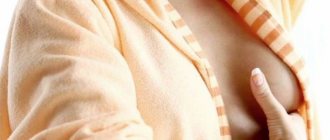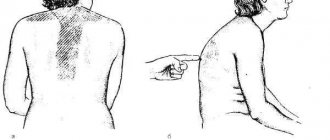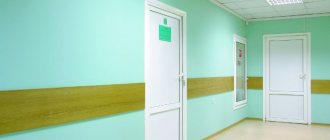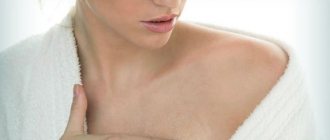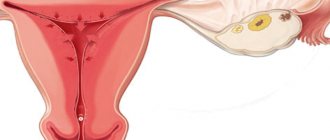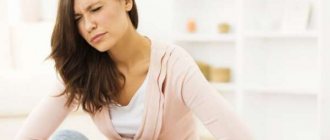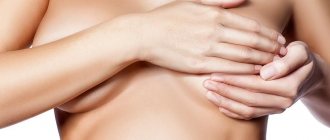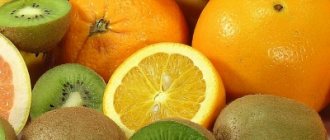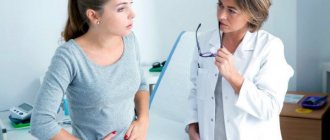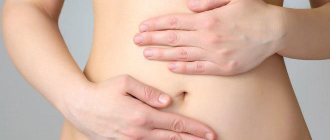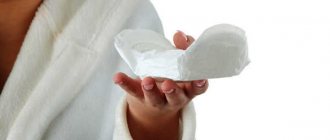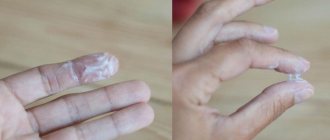The level of hormones in the female body is constantly changing. This is due to physiology and the changes that occur during the menstrual cycle. All the female genital organs prepare for fertilization during the first half, and fade away during the second half. This is where hormonal fluctuations occur. They are expressed by changes in mood, deterioration in well-being, and often chest pain in the middle of the cycle.
Processes in the middle of the cycle
A gynecologist or mammologist will help determine why a woman has pain in her breasts. Most often, pain in the mammary glands is felt during the onset of ovulation, on the 9th–14th day of the cycle. Hormones responsible for successful fertilization of the egg reach their peak concentration. The endometrium of the uterus changes, pain and swelling appear.
The cessation of ovulation is followed by a decrease in hormone levels. In a healthy body, discomfort in the chest disappears. If the pain remains until the onset of the critical days, then doctors consider it a pathology. Because discomfort is caused by unsteady hormonal levels. A lack of progesterone does not allow the glandular tissue to return to its original state.
Sometimes the nipples hurt, although no changes are observed there. This fact is due to their excessive sensitivity. This is how the nerve endings in the nipples react to changes occurring in the mammary glands. The same thing happens during pregnancy. Pain blocks stimulation of the nipples, which causes the uterus to contract (tone), which may prevent the embryo from implanting in it. Thus, the uterus is in a calm state and does not contract, and pregnancy develops without complications.
Nipple pain and pregnancy
Nipple pain is also one of the early signs of pregnancy.
In this case, pain, as with ovulation, is caused by excessive production of hormones - progesterone and estrogen. The concentration of progesterone in the blood increases several times, due to which the fertilized egg successfully attaches to the walls of the uterus. And estrogen helps to increase breast size. Small bumps may appear on the nipples, which increase their soreness and sensitivity. This is the preparation of the breast for subsequent lactation.
Pain in the nipples during pregnancy also serves a protective function, protecting the body from a possible miscarriage. This is due to the fact that the soreness of the nipples excludes their stimulation, that is, touching them, which tone the uterus. Thus, there is no contraction of the muscles of the uterus, and the embryo successfully attaches to its walls and begins to develop.
Causes of pain
The most common reasons why the mammary glands hurt are surges in hormone levels (their sharp increase/decrease) and fluid stagnation. The accumulation of water is not limited to the extremities. Excessive consumption of salt, alcohol, wearing tight underwear and an unbalanced diet can cause swelling of the bust. The woman feels that her breasts are swollen, bulging vessels are visible on its surface, and a nagging pain is felt.
If earlier in the middle and end of the menstrual cycle a woman did not feel pain in the mammary glands, then this is a reason to visit a doctor. This symptom may indicate the presence of a disease.
Mastopathy
Mastopathy is a benign neoplasm in the breast that develops as a result of hormonal imbalance. Signs of pathology:
- mastodynia, disturbing after ovulation;
- in two breasts, less often in one, small multiple balls and seals appear.
At the end of the critical days, the symptoms disappear. At first, women may attribute this to premenstrual syndrome. Over time, the seals degenerate into large cyst-like nodules. With fibrocystic mastopathy, the pain intensifies and does not go away until the end of menstruation. The lumps are easily palpable, and when pressure is applied to the nipples, bloody or yellow liquid flows out.
Subsequently, genital dysfunction, infertility, painful, heavy or scanty menstrual flow are observed. Advanced mastopathy can degenerate into oncology.
Mammalgia
Due to the increased levels of the hormones estrogen and prolactin in the body, the progesterone phase does not occur, and mastodynia occurs. The cyclic form of the pathology is characterized by swelling of the nipples on both breasts and discomfort in the middle of the cycle. Noncyclic mastodynia causes sharp pain in one of the mammary glands, and there is no swelling.
Oncology
Sarcoma or malignant tumor (cancer) has similar symptoms to mastopathy. Breast cancer is characterized by tenderness and enlargement of the lymph nodes. The danger is that at the initial stage there are no symptoms and diagnosis occurs untimely. Statistics indicate that this type of cancer has the highest mortality rates among all cancers in women.
Mastitis
Provocateurs are infectious agents that have entered the glandular tissue and hypothermia. More often, women during lactation are at risk, when the menstrual cycle is in the recovery stage. During the period of ovulation, an inflammatory process develops, pain and swelling appear, and the bust increases in size. All this is accompanied by increased body temperature up to critical levels and redness of the skin.
The main factor provoking the disease mastitis is lactostasis. There are no symptoms for a long period, and this is the danger of the pathology. Nursing may not need treatment; blockages in blood vessels can be relieved by expressing milk. In other cases, the doctor prescribes medications.
Estrogen and prolactin
The hormones prolactin and estrogen, which affect a woman’s reproduction, affect the release of the egg into the uterine cavity for fertilization. Prolactin prepares the mammary glands for future pregnancy. Due to the increase in glandular tissue, the bust swells, while the connective tissue does not change. Therefore, compression of blood vessels and nerve roots occurs, blood circulation worsens, and pain is felt. This is followed by the active production of progesterone, which is necessary to maintain pregnancy. Hormones at this moment reach their peak concentration in the blood.
After ovulation, hormones should return to normal. If this does not happen, blockage of the ducts occurs. As a result, mastopathy or inflammation develops. Ultrasound of the mammary glands, CT scan and mammography will help detect the problem.
Pain when menstruation is delayed
The most likely cause of nipple and breast pain is pregnancy. However, if the test is negative, then the delay may indicate serious pathologies:
- problems in the nervous system (stress due to postmenopause)
- disorders of the thyroid gland
- malfunction of the adrenal glands
- breast cyst
- mammary cancer
- injuries to the breast and nipple received during sexual intercourse
- postoperative period
- allergic reaction
- incorrectly chosen clothes
If your nipples hurt and you haven’t had your period for 5-6 days, and the test is negative, you should urgently consult a doctor.
How to understand that you need to see a doctor
Every woman who experiences breast pain, regardless of age, should make regular visits to a mammologist and gynecologist. You should immediately consult a doctor if you have the following symptoms:
- point pain in a certain place;
- 1 or 2 breasts hurt a lot for a long time;
- if there are accompanying pains of a lasting nature in the lower abdomen;
- upon examination, compactions, balls and other strange formations are felt;
- mood swings – excessive emotionality, irritability, lack of control of feelings;
- if there was no pain before – primary;
- change in skin color and areolas, cyanosis;
- brown or red discharge from the nipples;
- weakness, nausea, chills;
- the vessels rise above the skin and are dilated;
- sores or cracks in the nipples.
You should not ignore the symptoms and signs of pathologies that the body itself suggests. Hormonal levels will not recover on their own without the help of a competent doctor and medications. Timely diagnosis is the key to successful treatment of many breast diseases.
Pain after menstruation stops
Pain after the cessation of menstruation in most cases indicates pathological changes in the body.
Problems that cause discomfort include:
- injuries to the chest and its area (first of all, it is the injured areas of the chest and nipples that begin to hurt, since they are especially sensitive during the cessation of menstruation)
- hormonal imbalances (can be caused by the approach of menopause, termination of pregnancy, taking contraceptives, severe stress, climate change)
- early stages of pregnancy (in some cases, the menstrual cycle after conception may continue, but its nature changes)
- overgrowth of breast tissue (can be caused by heredity, stress, miscarriage)
- inflammatory processes in the mammary glands (improper hygiene, hypothermia, nipple injuries, uterine infections)
- cancer (unpleasant sensations are accompanied by discharge from the nipples, enlarged lymph nodes)
Ways to eliminate pain
If severe pain is caused by physiological changes in the body, then a woman can help herself at home. However, it is better not to risk it and consult a doctor.
If the pain is unbearable, it is worth purchasing painkillers; some of them do not require a prescription. Ibuprofen, No-spa, Naproxen, Ketorolac will help alleviate the condition. Their benefits are questionable, so medications should be taken in extreme cases or on the recommendation of the attending physician. He will conduct a diagnosis and if he does not detect any diseases, he will prescribe pain medication. Also, the use of such drugs is prohibited for pregnant women and those planning pregnancy.
Intense and constant pain is relieved by Tamaxifen and Danazol. They are prescribed with caution and under the supervision of a doctor, as they have an extensive list of side effects.
Birth control hormonal pills are prescribed when pathologies are detected. It is extremely difficult to find them. It happens that when taking oral contraception, on the contrary, the breasts begin to hurt in the middle of the cycle under the influence of changes in the level of prolactin and estrogen.
Vitamin complexes with vitamin E and magnesium-containing preparations will help eliminate discomfort. Magnesium has a positive effect on the nervous system (NS), improves mood, increases physical activity and relieves pain before critical days. Strong tea, energy drinks and coffee excite the nervous system, resulting in increased pain. You should temporarily abstain from these drinks.
Breast massage is another way to relieve pain. It is necessary to massage the bust in a circular motion, improving blood circulation in this area. During the period of ovulation, it is recommended to wear loose underwear that does not restrict movement, or avoid it altogether. During this period, the bust needs rest and limitation of physical activity on the pectoral muscles.
Dermatological causes of nipple pain
The cause of discomfort may be dermatological diseases:
- Psoriasis. It belongs to a number of allergic diseases, when the papilla and adjacent skin become covered with red spots.
- Eczema. It is a non-infectious disease, accompanied by pain in the nipples, burning, itching, redness, and blisters.
- Candidiasis. A fungal disease, indicated by affected skin and mucous membranes. In some cases, pathological processes are localized in the nipple area and are accompanied by cracks, blisters, and swelling.
- Herpes. A viral disease accompanied by severe chest pain, redness of the skin and the formation of small blisters on it. Subsequently, the blisters burst, and in their place an inflamed itchy crust forms.
- Impetigo. Skin inflammatory disease with the appearance of pustules. The development of pathological processes can be caused by the penetration of infection into the skin through cracks in the nipples.
Diet to reduce chest pain
In addition, a properly selected diet during ovulation will help reduce pain in the breasts and nipples.
The following products are not recommended:
- fatty and spicy foods
- carbonated and alcoholic drinks
- sweets and flour
- caffeine
It is recommended to include in the diet:
- fresh fruits and vegetables
- fish
- foods that contain large amounts of magnesium
During periods of severe pain, you can take sedatives based on herbs: motherwort, valerian, mint and lemon balm, with the addition of honey.
Decoctions of herbs such as chamomile, calendula, St. John's wort, nettle and dandelion will help relieve pain, but before taking infusions you need to make sure you are not allergic to these components.
In addition, you can do self-massage of the chest, walk in the fresh air and regularly take a contrast shower.
